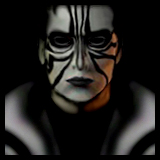|
|
| Line 1: |
Line 1: |
| {{Eras|exd}} | | {{Eras|exd}} |
| {{Hitoric|Scholae Palatinae}} | | {{Historic|Scholae Palatinae}} |
| {{Structure | | {{Structure |
| |image= | | |image= |
Latest revision as of 15:57, 20 March 2022

|
The Jedi were real? This article is part of the history of Clan Scholae Palatinae and isn't part of current events.
Please do not remove this tag or the contents. These articles exist for historic purposes.
|
 Rhaub D'ar Aghasett Palpatine
Rhaub D'ar Aghasett Palpatine In honor of former Quaestor Rhaub D'ar Aghasett Palpatine, formerly known as Corde Aghasett, one of the Brotherhood’s most respected artists, the gallery contains thousands of works of art, from outdoor sculptures to antique paintings bought on Corellia’s black market. Several times a year, different exhibitions are presented at the Art Gallery: most exhibitions present artwork crafted by the members of Acclivis Draco.
Structure
The Art Gallery’s lobby is rectangular while the rest of the building is elliptical and the roof, a piece of art in its own right, is a dome that forces all noises inside the Gallery to be amplified, and thus makes sure that the people inside are quiet. A group of specialized members of Acclivis Draco’s Security Force polices the gallery constantly.
Squares of Blood
From the journals of Major Samantha Benutad, 5th Legion: 507th Infantry, Kraken Regiment dated Kelona 28, 27 ABY:
I had come to the Main campus from Antenora Military to speak with the newly appointed Quaestor Palpatine, and he was gracious enough to give me a tour of the oasis buildings. Since neither he nor I were sure where to start, we decided to go in alphabetical order.
Aghasett Art Gallery is a work of art per se. I find the main lobby the most intriguing part of the building. Directly in the center of the floor, a small marble square (3.1 inches by 3.1 inches, Quaestor Palpatine informed me), the color of sanguine crimson, lured my newcomer’s eyes to its center. I even bent over to touch it with an ungloved hand to make sure that it was solid and real.
When my hand ran over its smooth surface, I realized that there was a small keyhole in the center. The grinning man sitting at the front desk told me to look straight up at the ceiling, so I did. A silver key (3.1 inches long again, Palpatine told me) hung on a sanguine satin rope high above from the center of the dome, well out of my reach.
The designer of such an elaborate piece must be a magnificent artist himself.
The Portal and Halls
Five halls, each displaying a different medium of art: sculpture, holograms, and even archaic oil paintings, branch off from a circular lounging area called “the Portal.” “The Portal” is named as it is because it is, in essence, the crossroads between different worlds. The lounging area contains armchairs and benches for people to rest their bodies and minds.
The Portal contains the entrances and exits into six worlds: the five art halls and the lobby, and is considered, by some, to be a piece of art because of it being a metaphor, as well.
- Hall A is home to small sculptures (smaller than 100 square feet), archaeological artifacts, and carvings.
- Hall B contains large sculptures.
- Hall C contains canvas paintings and holograms.
- Hall D contains pieces of metalworking.
- Hall E contains the bi-monthly member exhibition.
A Rumored Basement
Hidden underneath the priceless artifacts, a small basement exists. Depending upon the version of the story, many different things are hidden in this basement – from extensive art history archives to the bodies of those who attempted to steal pieces from the Gallery.
However, it has been confirmed that the House Acclivis Draco Historical Review – an interviewing staff – keeps its records stashed away in this basement; Rhaub D'ar Aghasett Palpatine was the creator of the Review and oversaw its development for several years.